Students are still students who need our guidance. Teachers forget that the element of improvement is nourishing knowledge. It means we use what we already have and ensure it doesn’t lay waste! We don’t want knowledge to scratch the surface. It’s up to us to embed these lessons and make them learn. Our students should be able to use what they’ve learned. Learning is continuous and maintained through consistent instruction. So, how do we preserve knowledge and teaching? We can do that with a Course Website!
As teachers, we need to give them the salient parts of lessons. These are what will help them in the future. It sometimes gets lost in the vast sea of information. A Course Website helps us identify what they need to learn. Students will make mistakes and encounter rough patches. Some may struggle more than others, but that’s okay! We teachers are the mentors who will help them through it. And this is why it’s significant to leave a learning space. But how do we create a course website? We can do this with the help of a Course Website Builder!
- What Is A Course Website Builder?
- How to Choose the Best Course Website Builder Software?
- Best Course Website Builders Comparison Table
- 7 Best Course Website Builders for Educators
- How to Make A Course Website with OnlineExamMaker?
- 6 Tips to Create An Engaging Online Course
- Course Website Builders FAQ
What Is A Course Website Builder?
A course website builder is an online program that builds a website for your educational needs. It helps ease the trouble of programming and managing a website. You won’t have to put in the labor. Only add the lesson content! It is a lifesaver for educators who don’t know where to start. A course website builder is a fitting tool to create a storage space for educational material.
You can employ tests, assignments, and lessons on a course website. It’s like an online library-slash classroom that’s helpful for both teachers and students. In this way, they can still learn and improve their knowledge. No student is a lost cause when it comes to education. So, how do we choose the appropriate software for course building? Don’t worry because we listed out the features you need!
How to Choose the Best Course Website Builder Software?
Know what you’re looking for in a course website builder. You have to identify what features are significant for your teaching strategy. And you need to ensure that it can live up to your expectations. Here are the features you should look for in choosing a course website builder:
Simple
The course-building software you choose should be easy to navigate. You should be able to maneuver its tools with no problem. That means the software you pick should be beginner-friendly. It should center around both you and your students!
Customizable
The course builder should be customizable or allow personalization. It means that it should let you add your touch to it. A personalized course website will make it easier and more understandable. And not only for the teacher but for their students as well!
Adaptive
The software you choose should be infallible and steadfast. It means that it should be able to handle loads of data. The course-building software should have steady servers. In this way, it can handle multiple users at once. And you won’t have to worry about errors or failures!
Accessible
The course builder should be mobile and usable on any device. It means you can use it wherever and whenever. And this is significant, especially if your course website is not a school requirement. It should always remain accessible to you and your students.
If you still don’t know how to create a course website, these platforms will help you! Here are the seven best course website builders made for educators.
Best Course Website Builders Comparison Table
| Software | Top Feature | Pricing | Ratting | Free Trial |
|---|---|---|---|---|
| OnlineExamMaker | Drag & drop academy page builder to build course site without coding | $32/month | G2, 4.5/5 | Signup Free |
| Canvas LMS | Multimedia-rich content creation with videos, images, and interactive modules | Custom | G2, 4.4/5 | Free Trial |
| Thinkific | Brand your courses with custom logos, colors, and domain names for a professional look | $36/month | G2, 4.6/5 | Signup Free |
| LearnDash | Reward learners with certificates, and course points to motivate students | $199/year | G2, 4.3/5 | Signup Free |
| WizIQ | Upload courseware in any format and create interactive self-paced eLearning courses | Custom | G2, 4.2/5 | Free Demo |
| Odoo | Install different languages and translate the content directly from any page | Free | G2, 4.1/5 | Signup Free |
| Classe365 | Provides collaborative teaching and learning for your team | $50/month | G2, 3.5/5 | Signup Free |
7 Best Course Website Builders for Educators
1. OnlineExamMaker
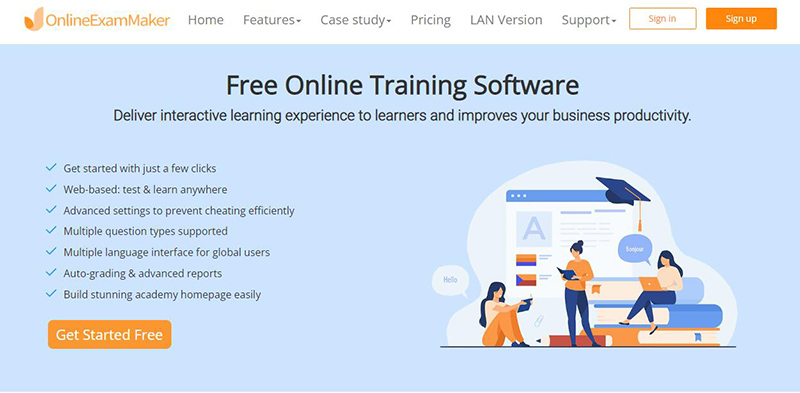
G2 Rating: 4.5/5
Pricing: Free trial. If you want to create courses in OnlineExamMaker, you need to upgrade to Premium plan, which costs $55/month, bill annually.
First on the list is OnlineExamMaker! OnlineExamMaker is a course-building platform that helps teachers enrich their courses. It lets users create a personalized and customized website for education. OnlineExamMaker has secure and high-performance servers. You can access your course content anytime and anywhere! It has a bulk import feature that lets you upload your course data.
With OnlineExamMaker all-in-one online LMS, teachers and trainers conduct & manage teaching, learning, and testing in one place. You can combine learning and testing in one place, and assess students before, during, or after training.
Best Features
● User-friendly interface for easy course creation and management.
● Mobile-friendly design for learning on the go.
● Create custom certifications for learners after training.
● Single sign-on (SSO) integration for seamless user authentication.
● User roles and permissions for effective user management.
● Face ID verification technology to prevent cheating.
● Add video, audio to make interactive learning experience.
Cons
● It has limited themes and templates for primary app users.
● It doesn’t have a formal app but can be accessed through a browser.
Create Your Next Quiz/Exam with OnlineExamMaker
2. Canvas LMS
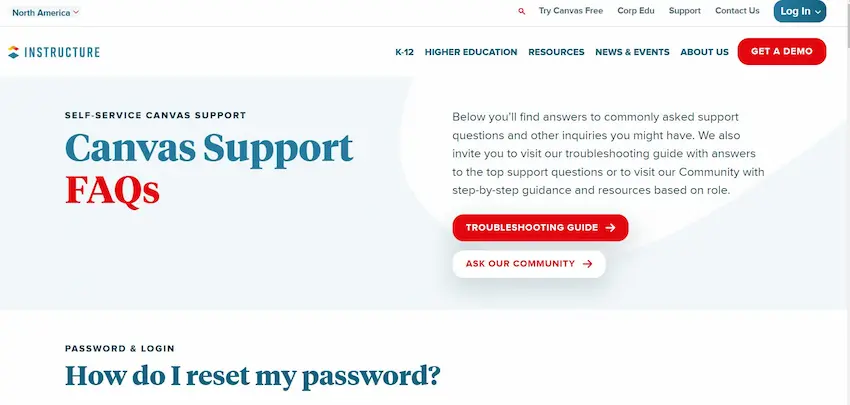
G2 Rating: 4.4/5
Pricing: Custom price quote.
Second on the list is Canvas LMS. Canvas LMS is an online LMS platform that allows you to manage online learning courses in one place. It lets you assemble course content, daily lessons, assignments, tests/quizzes, and feedback. In addition, you can communicate with your students or meet them virtually! It has an easy-to-use interface accessible from both computer and mobile devices. The course built under Canvas is under the power of its LMS. The lessons are the foundation of modern classrooms and courses. It helps speed up both learning and teaching. And it provides scalability for teachers and students.
Best Features
● Multimedia-rich content creation with videos, images, and interactive modules.
● Personalized learning paths tailored to individual student needs.
● Course calendar and scheduling features.
● Video conferencing integration for virtual classes.
● LTI and API integration for connecting with external systems.
● Real-time feedback and interactive assessments.
Cons
● Canvas LMS is complicated to navigate.
● Canvas LMS has a restrictive support bot with limited support.
3. Thinkific
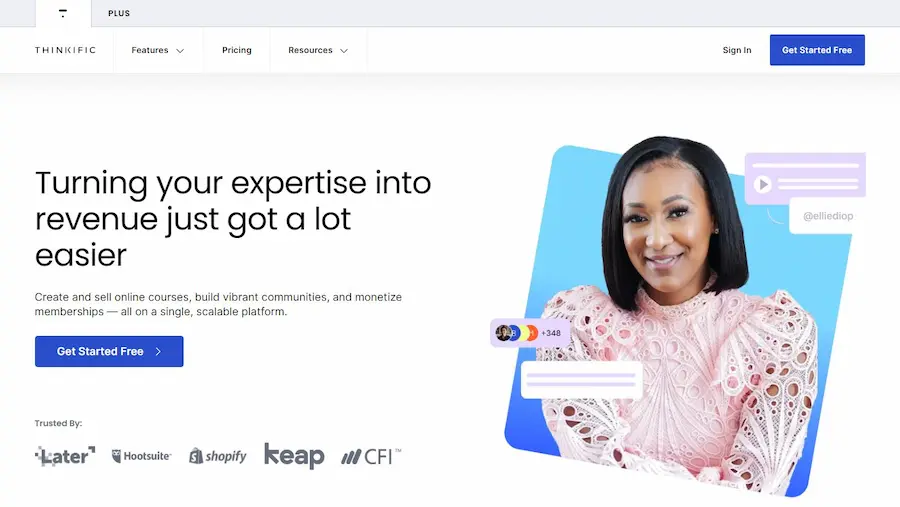
G2 Rating: 4.6/5
Pricing: Free. Thinkific provides 3 subscription plans, Basic plan, $36/month; Start plan, $74/month; Grow plan, $149/month.
Third on the list is Thinkific. Thinkific is an online course platform that empowers individuals, entrepreneurs, and organizations to create, market, and sell online courses. The software offers an easy-to-use tool for building courses without requiring advanced technical skills. Launched in 2012, Thinkific has become a popular choice for course creators looking for a user-friendly and customizable platform to deliver their content to a global audience.
Best Features
● Course creators can add a variety of multimedia elements, including videos and quizzes.
● Brand your courses with custom logos, colors, and domain names for a professional look.
● Built-in discussion forums facilitate interaction and community for learners.
● Supports various pricing models, including one-time payments, subscription plans, and installment payments.
● Award certificates to students upon course completion.
● Monitor individual student progress, quiz scores, and sales.
Cons
● Not cost-effective for freelancers.
● Limited instructions and advice on how to use its interface and tools.
4. LearnDash
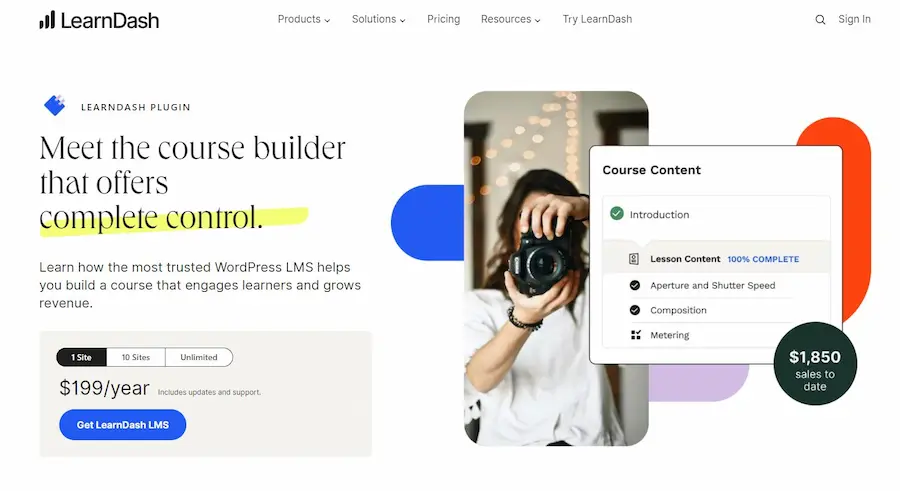
G2 Rating: 4.3/5
Pricing: $199/year for 1 website.
Fourth on the list is LearnDash. LearDash is an online course-builder that lets you create customized courses. LearnDash gives you complete control over how you build your course. You can personalize it to your subject matter. Its course-building platform lets you create engaging quizzes, tests, and certificates. And it provides course security and data protection. You don’t have to worry about leaked content or breaches. LearnDash is from educators for the use of fellow teachers. It lets you manage course content and collaborate with other teachers. LearDash provides a smooth user interface for your students, too! And the best part of all is you can monetize your courses! It has flexible pricing for subscription plans.
Best Features
● Create courses with flexible pricing models and customizable designs.
● Easily approve submissions, leave comments, award points, and gamify course content.
● Reward learners with certificates, and course points to motivate students.
● Choose from checkout options with PayPal, Stripe, WooCommerce, RazorPay, or 2Checkout.
● Share individual scores and progress with students and their parents.
● Send automated assignment reminders to the class and protect your course from spam and plagiarism.
Cons
● LearnDash is pricey.
● LearnDash offers mildly substantial tools for learning.
5. WizIQ
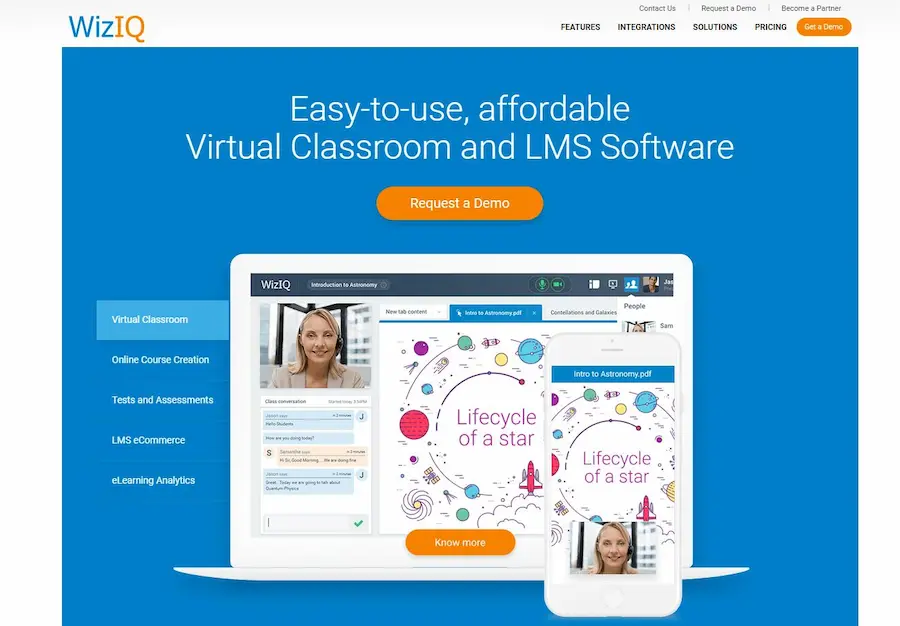
G2 Rating: 4.2/5
Pricing: Free demo. Custom pricing.
Fifth on the list is WizIQ. WizIQ is a course-building program that is easy and affordable for teachers. It has all the tools that an educator needs to deliver online learning. You can create and sell your online courses for profit. WizIQ allows you to create and sell interactive courses that are self-paced or live classes. You can use its software to tutor your students and expand into new markets and audiences. With WizIQ, you can deliver learning on the go. WizIQ has mobile apps for both Android and iOS users. Transforms your phone or any device into a portable and flexible course-builder. WizIQ is for learning in K-12 and high-level education.
Best Features
● Create and sell interactive courses to learners all over the world.
● Upload courseware in any format and create interactive self-paced eLearning courses.
● Appeal to different learning styles using varied formats, including text, presentation, and audio-videos.
● Easy to create, launch and analyze online tests and assessments.
Cons
● WizIQ isn’t an open-sourced course-builder.
● WizIQ is a pay-per-use software.
6. Odoo
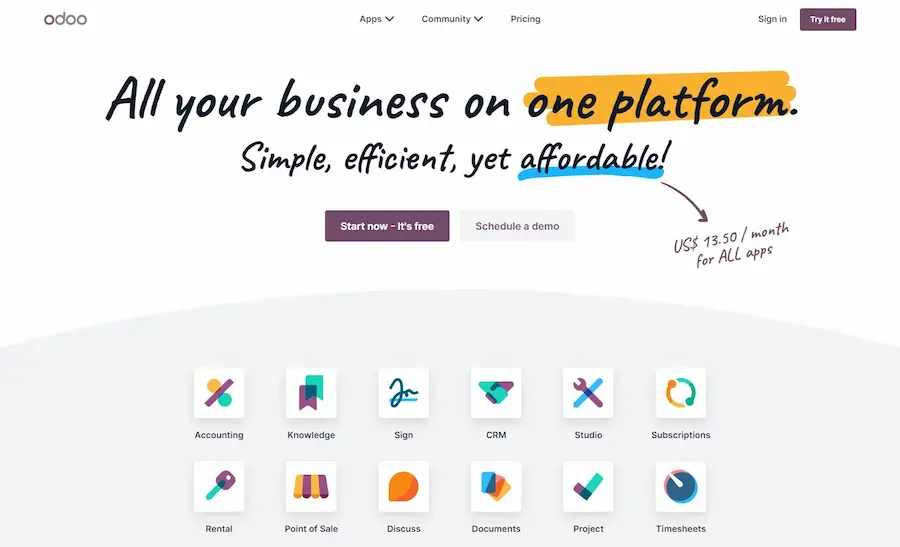
G2 Rating: 4.1/5
Pricing: Open source.
Sixth on the list is Odoo. Odoo is a course builder slash LMS platform. You can create a dazzling course with Odoo’s intuitive website builder. Odoo lets you be the source of knowledge. And you can share your course content with students and the world! Engage your pupils and hook them in with your lessons. Keep their motivation up with Odoo’s intuitive platform. They can track and follow up on their progress. And you can evaluate their performances, too! Odoo lets you employ assessments and certifications. It allows you to empower students by providing substantial feedback. And you can further their knowledge and skills!
Best Features
● Easily lets you make a profit from your courses.
● Add you logo to your course website for branding.
● Drag and drop building blocks to make your website without coding.
● Install different languages and translate the content directly from any page.
Cons
● Odoo has limited details on each course tool.
● Odoo doesn’t have enough customer support.
7. Classe365
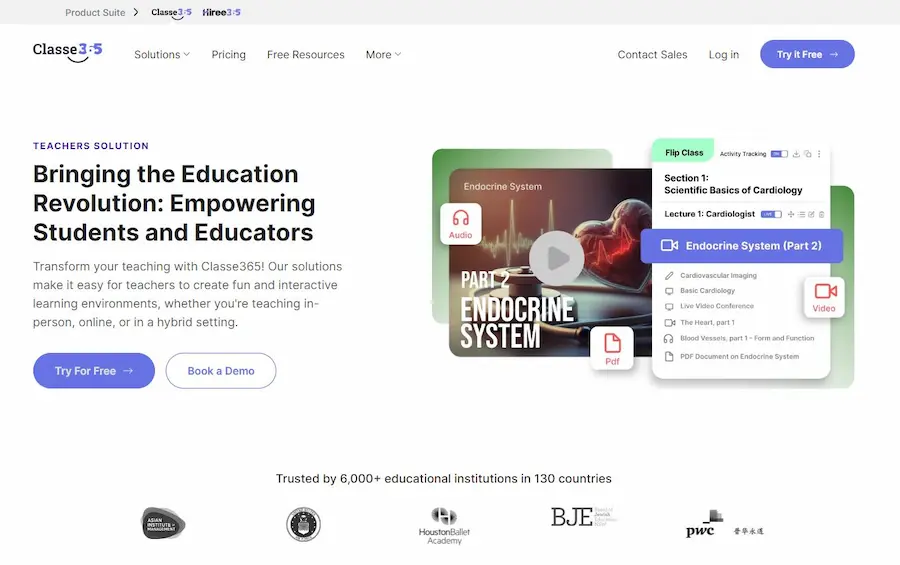
G2 Rating: 3.5/5
Pricing: Free trial. Paid plans start from $50/month.
Last but not the least is Classe365. Classe365 is a School Management Software made for modern use. It is a course builder that lets you run your subjects how you want. Classe365 is a cutting-edge school management software that simplifies regular tasks. It allows you to build courses and course material efficiently. Classe365 is the teacher’s solution to bring revolutionary education. It empowers both students and educators alike. You can transform your teaching with Classe365! Build a fun and interactive learning space for your students. A course software used both in-person and at home. Classe365 provides immersive learning with its integrated LMS. You can build your courses under Classe365!
Best Features
● Seamlessly manage student data with our student database management system.
● Provides collaborative teaching and learning for your team.
● Observe behavioural trends and improve student success.
● Online test proctoring to stop cheating during assessment.
● Expand your revenue potential with all-in-One eCommerce module.
Cons
● Class365 has limited features for personalized course-building.
● Class365 only offers limited features for primary users.
How to Make A Course Website with OnlineExamMaker?
Here is the step-by-step guide to make an online course and add it to your academy page in OnlineExamMaker:
Step 1: Create an online course
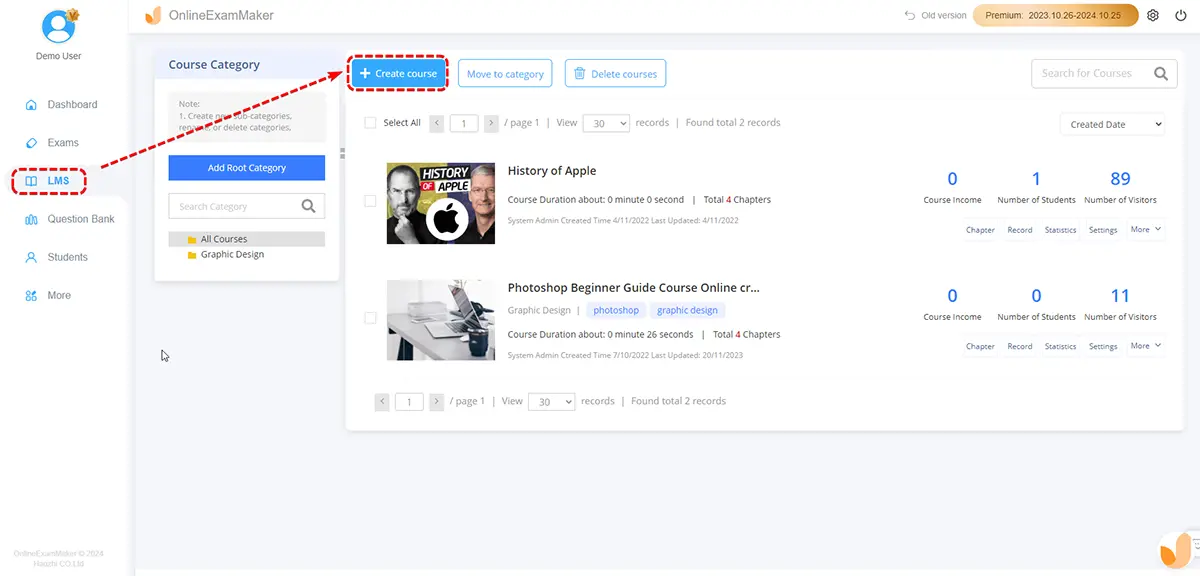
Go to the left side of the screen and click ‘Course Manager.’ Under that window, click ‘Courses’ and the ‘+ Create Course’ button. Add a category to organize and manage your course. Now, you’re ready to start creating your course.
Step 2: Fill in the course information
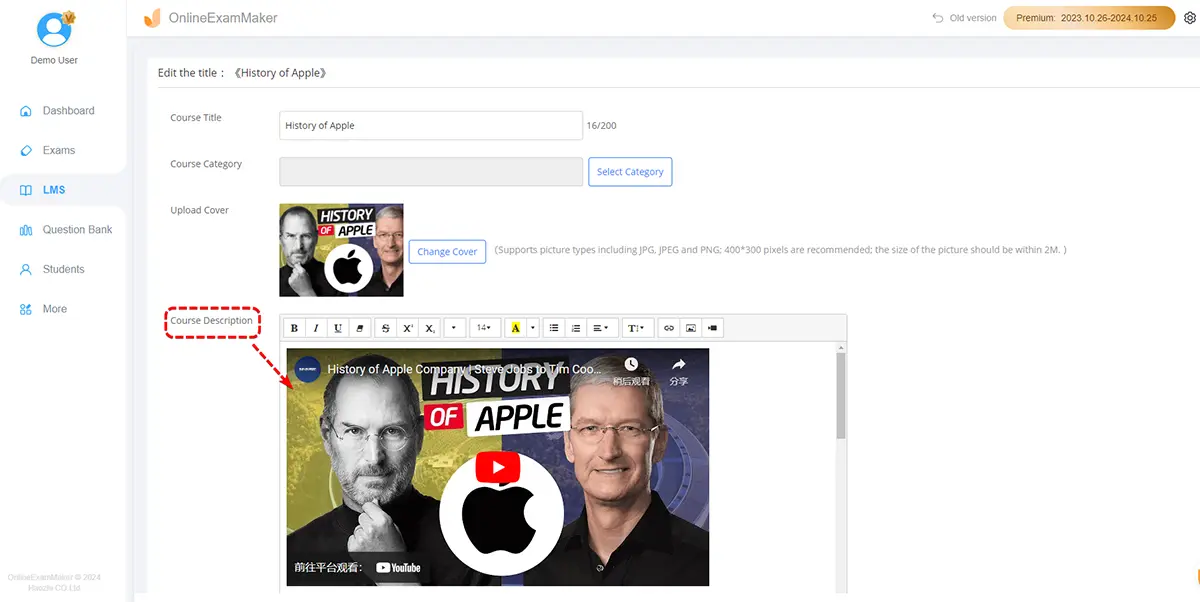
In this step, fill in the course title to add a name for your course. Encode the course description and select the category. Select a cover for your course in the templates, or upload your own!
Step 3: Add course chapters and coursewares
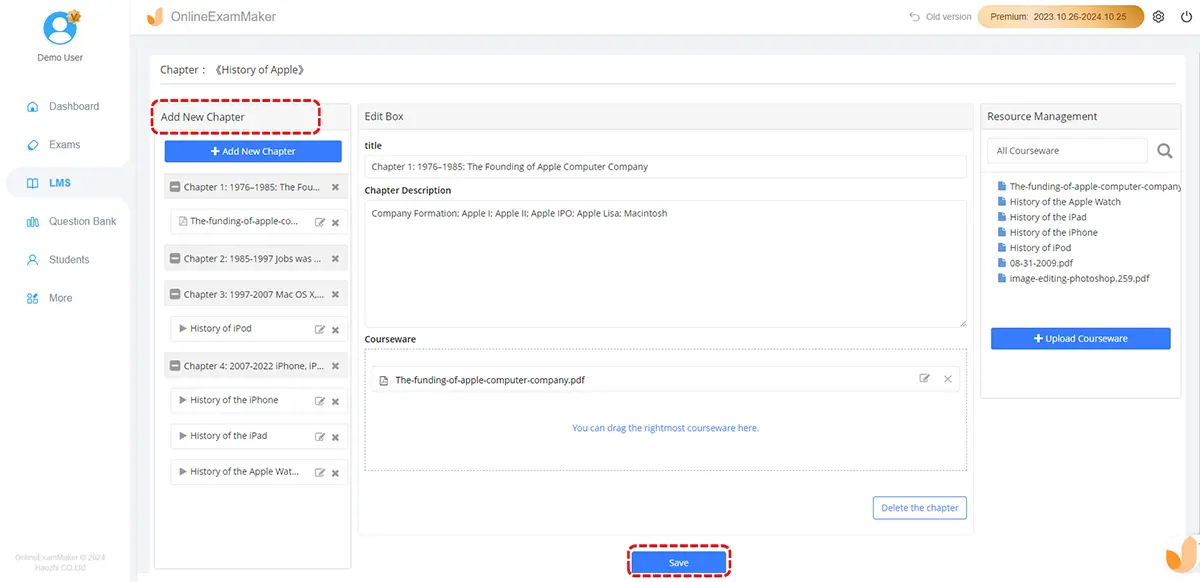
You can add chapters to your course. Drag and drop the courseware you uploaded on each respective chapter. In this way, the content is organized and sequenced.
Step 4: Adjust the settings
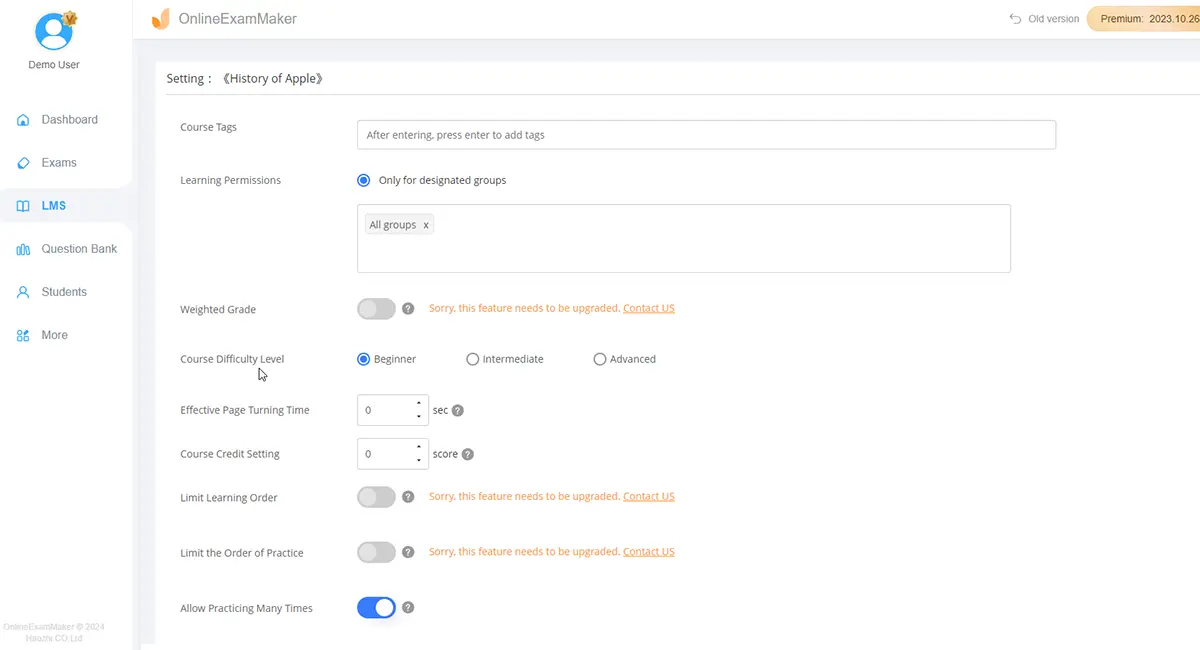
In this step, modify the course settings, like the label setting. You can also change learning permission, course opening time, course validity period, etc. Change the settings to however you need. Click ‘Finish’ to save and publish your course.
Step 5: Sharing the course
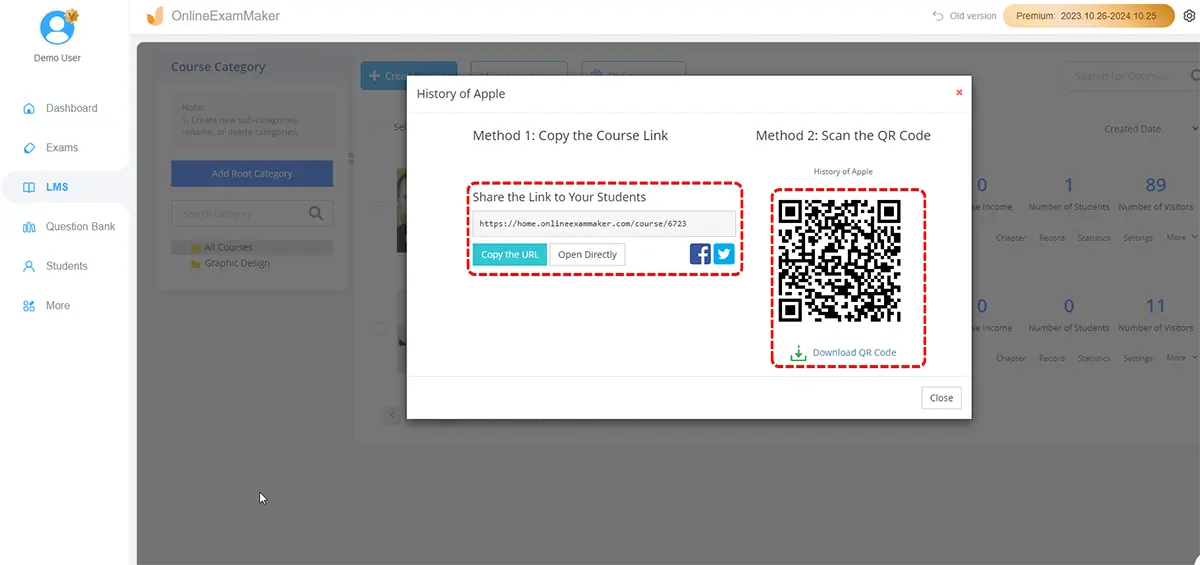
Use the customized link and QR Code of the course. Copy and share them with your students to start online course learning!
Step 6: Add the course to academy page
You can create an academy page in OnlineExamMaker, then add the course to the page. It is possible to connect your domain with the homepage, and share the homepage link to learners.
6 Tips to Create An Engaging Online Course
Creating an engaging online course is crucial for capturing and maintaining the interest of your learners. Here are some tips you should know:
Tip 1: Set clear learning goals
Clearly define the goals and outcomes of your course. This helps learners understand what they will gain from the experience.
Tip 2: Organize content effectively
Structure your course logically with well-defined modules and lessons. A clear flow enhances comprehension. You can also use headlines, bullet points, and multimedia to break up text and make content more digestible.
Tip 3: Use multimedia
Incorporate a variety of multimedia elements, such as videos, images, infographics, and interactive quizzes, to keep learners engaged.
Tip 4: Encourage interaction
Foster a sense of community among learners through discussion forums, group activities, and collaborative projects.
Tip 5: Create engaging assessments
Mix up assessment formats, including quizzes, projects, discussions, and peer reviews, to cater to different learning preferences.
Tip 6: Gamification elements
Integrate gamification elements like badges, leaderboards, and rewards to make the learning experience more fun and motivating.
Course Website Builders FAQ
Are course websites necessary?
The lessons we teach students should be rich and substantial. Different levels of education require different support. And it’s significant we know when and how to apply this support. We can do just that with a course website.
Can students utilize the course website without my presence?
Yes. Your students can access lessons, slides, and assignments anytime and anywhere! It allows you to create a personalized website for both teaching and learning. A course website is available at their disposal 24/7.
What is a course website builder?
A course website builder is a platform or tool that enables individuals, educators, or organizations to create and manage online courses. It provides features for designing course content, organizing materials, and facilitating interaction with learners.
What are the key features to look for in a course website builder?
User-Friendly Interface: Ensure the platform is easy to use for both creators and learners.
Content Creation Tools: Look for tools that allow you to easily upload and organize text, multimedia, and assessments.
Customization Options: Choose a builder that allows you to personalize the look and feel of your course.
Interactivity: Features like quizzes, discussion forums, and live sessions enhance learner engagement.
Analytics and Reporting: Access to data on student progress, engagement, and course effectiveness is crucial.
Payment Integration: If you plan to sell courses, check for seamless payment options.
Can I integrate multimedia content into my courses?
Yes, most course website builders support multimedia integration, including videos, audio files, images, and presentations. Ensure your chosen platform supports the file types you intend to use.
Is it possible to track student progress and performance?
Yes, tracking features are common in course website builders. You should be able to monitor individual progress, quiz scores, and overall engagement to identify areas for improvement.
Can I sell my courses using these platforms?
Yes. Many course website builders include e-commerce functionalities, allowing you to sell access to your courses. Look for payment gateways and secure transaction options.
Can I offer certificates upon course completion?
Yes, many course website builders have built-in features for generating certificates upon course completion. Verify the customization options for certificates and whether they align with your branding.